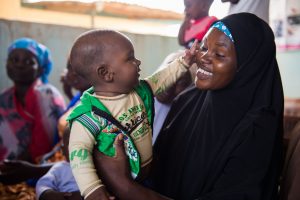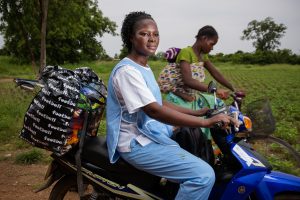Expanding choice in Nigeria and the Sahel region
In Nigeria and the Sahel region of Africa, millions of women want to avoid pregnancy, but don’t have access to contraception. MSI is working to change that and they’re making an impact, reaching millions of women across the region.
On June 11, Effiom Effiom, director of the MSI national office in Nigeria, and Sanou Gning, director of the MSI regional office in the Sahel, participated in an online discussion with Benoît Fontaine, general manager of the Myriad Canada Foundation, and the Professor Shelley Clark, Founding Director of the Center for Research on Population Dynamics at McGill University.
This discussion organized by Myriad Canada focused on reproductive health and reproductive rights in Nigeria and the Sahel.
 Why reproductive health and rights matter
Why reproductive health and rights matter
Effiom and Sanou described serious challenges facing women and girls. Without access to contraception, fertility rates are high—as many as seven children per woman. Professor Clark emphasized that child marriage is common in the regions, meaning girls and young women often have children before their bodies are ready. Many women and girls also don’t have access to skilled birth attendants and face other complications which result in high levels of pregnancy related death.
Controlling if and when to have children is essential to women’s economic empowerment. It allows women and girls to complete their education and space births to protect their health. For many women, early pregnancy and marriage force them to drop out of school, but contraception can break the cycle of poverty and promote gender equality.
Reaching the most marginalized
MSI is focused on making contraception available in the most marginalized communities, especially for women living in extreme poverty. For women facing poverty, reproductive healthcare might seem like a luxury—but the truth is, contraception is crucial to women’s well-being.
MSI is also tackling cultural barriers. They’re discussing how to integrate sexual education into school programs—and while it hasn’t happened yet, the fact that it’s being talked about is a step in the right direction.
Reproductive health and rights include the right to access safe abortion. MSI is ensuring abortion access to the full extent of the law—and, where necessary, working to change the laws. The need for safe services is urgent: Four in five abortions in the region are unsafe. Restrictive laws mean that seeking abortion is one of the main reason’s women go to prison. Making safe, legal services available—and providing lifesaving care after unsafe abortions—gives women control of their futures.
 Keeping services going through covid-19
Keeping services going through covid-19
Covid-19 has created new challenges. Effiom and Sanou shared how MSI is securing personal protective equipment (PPE) for service providers and coping with shortages of critical supplies like IUDs. Despite challenges, they say MSI is finding innovative ways to keep services going. They worked with governments and Ministries of Health to ensure that reproductive health was defined as an essential service and are using contact centers and social media to keep reaching clients, especially adolescents.
Empowering women worldwide
Myriad Canada is partnering with MSI to provide reproductive choices for women and girls and support MSI’s lifesaving work in the Sahel region. Despite serious challenges, MSI is having success across Nigeria and the Sahel. With the help of Myriad Canada, its donors to this project and other generous supporters, Effiom and Sanou are confident that they’ll reach even more women with contraception and safe abortion care.

